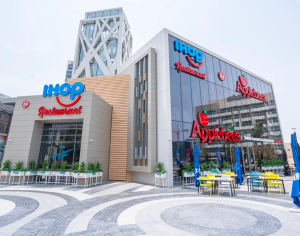It’s not often you come across new franchises entering the UK that have been going strong for over 50 years, but Oui, the fashion company, is one of them. “It’s a family business that started in Germany after the second world war,” says Thomas Boettger, sales director at Oui. While the sartorial powerhouse today specialises in female fashion, that was not the case when Paula and Mendel Gottesdiener first launched the company in the early 1950s. Instead, they tailored clothing for children. But even though customers loved to dress up their offspring in this garb, it was when the Gottesdieners’ son Nathan took over the business in the 1960s that Oui switched gears and began creating couture for women rather than kids’ clothes. And this would prove to be a stroke of genius as it would become the company’s dominant revenue stream for decades to come. Today fashionistas can peruse Oui’s garments through wholesale partners in 25 countries around the world. “And now it’s run by the third generation,” says Boettger. “It’s a very stable German company that is fully owned by the family.” However, the road to becoming a stable sartorial institution hasn’t been without the odd dropped stitch along the way.
For instance, while Oui is currently looking for franchisees in the UK to join its new model, this isn’t the first time that the franchisor has attempted to franchise on these shores. In fact, the company first franchised stores in Britain in the 1980s. “At its peak we had ten stores in the UK,” says Boettger. “But it was a different time.” While initially successful, most of the stores had closed by the end of the 1990s. One of the reasons was because it simply became too expensive for the store owners to stay open as Oui treated franchisees like wholesale partners. This left them having to buy all clothes from the franchisor and deal with the cost themselves if they didn’t sell enough. “We made a lot of mistakes and at the end of the day it didn’t work out,” says Boettger. As a result all franchised stores in the UK closed – save for one in Harpenden, which is still operational under the old model today – and Oui instead focused on selling its clothes through wholesale retailers like John Lewis and House of Fraser.
But that wasn’t the only thing encouraging the company to try out some new threads and rethink its business model. “Retailers, and not just fashion ones, were having more and more problems,” says Boettger. “People were starting to buy things from online retailers instead of local shops.” With the advent of online retail giants like Amazon and Alibaba as well as innumerable smaller firms there has been a clear shift towards shopping online rather than in high street stores. Depending on where they are in the world, between 23% and 37% of consumers have stopped purchasing things in stores due to online shopping platforms, according to a report from PwC, the professional service firm. And the turning tide was surely felt by Oui. “It was a lot of pressure,” says Boettger.

Eric Johansson
As web editor and resident Viking, Johansson ensures Elite Franchise is filled with engaging and eclectic entrepreneurial stories. While one of our most prolific franchise writers, he has sharpened his editorial teeth by writing about entertainment and fitness. Follow him on Twitter at @EricJohanssonLJ to catch up with his stream of consciousness.

Eric Johansson
As web editor and resident Viking, Johansson ensures Elite Franchise is filled with engaging and eclectic entrepreneurial stories. While one of our most prolific franchise writers, he has sharpened his editorial teeth by writing about entertainment and fitness. Follow him on Twitter at @EricJohanssonLJ to catch up with his stream of consciousness.


































